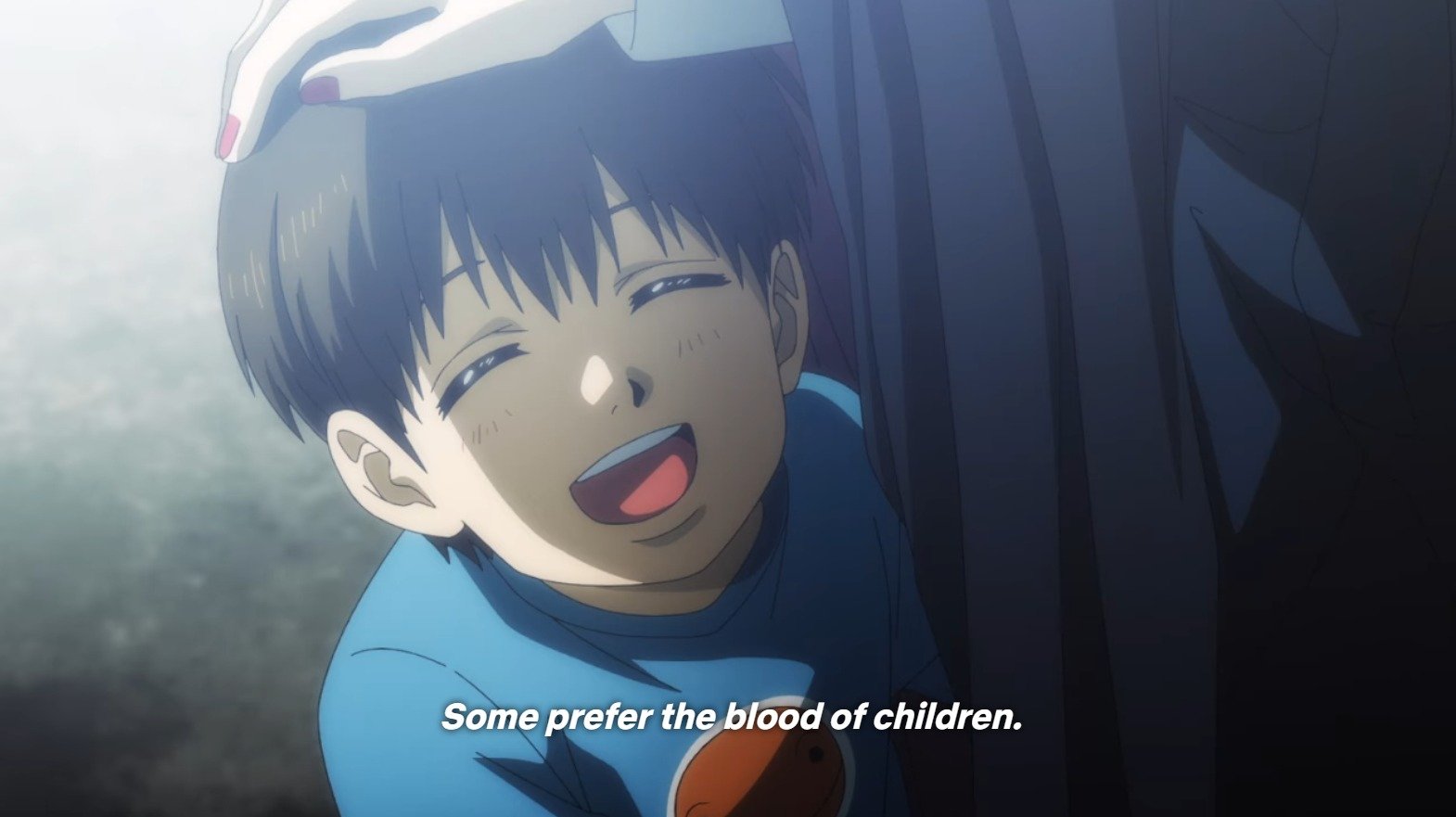Season aired: Winter 2025
Number of episodes: 12
Watched on: Netflix
Translated by: Helen O’Horan
Genres: Comedy, Supernatural, Romance
Thoughts: Put a centuries old vampire in a bathhouse in the midst of a love hexagon, and you have Babanba Banban Vampire, one of the weirdest anime to have come out this season. Mori Ranmaru is a vampire from the 1300s who finds himself in the home of a family that owns a public bathhouse. There, his bloodlust for Rihito, the sixteen year old boy who saved a dying vampire at six years old, forces him headfirst into a series of relationship miscommunication and love entanglements.
I’m going to say it outright — there is a problem with this series, but it’s a little more complicated than just saying this anime demonizes gay men under comedy. Ranmaru as a vampire is only attracted to guys, and he even notes his preference in “blood” differs from other vampires who might prefer girls, or more specifically, virgin girls. The issue at hand is that his current object of affection is Rihito, a teenager who he’s met and known since Rihito was only an elementary school student. By Ranmaru’s own words, he’s been keen to ensure Rihito stays “pure” for the sake of sucking his blood dry at eighteen years old. The similarities to grooming are obvious, right down to Ranmaru’s controlling nature of ensuring that no girl actually gets close to Rihito, masked by the anime’s usage of comedy.
However, that being said, Ranmaru’s actual past lovers were not only adult men in their 30s to 50s, but he first met them when they were already grown men. One fun fact about this series is that the titular protagonist, Ranmaru, is an actual famous historical Japanese figure. In the 1300s, Oda Nobunaga, one of Japan’s most famous warlords of the Sengoku era, had a retainer by the name of Mori Ranmaru. Ranmaru was noted as an exceptionally beautiful young man, and to this day is considered one of Nobunaga’s many lovers. In fact, in the historical event where Nobunaga was betrayed and murdered, Ranmaru died with him. The series fictionalizes it by turning Ranmaru into a beautiful immortal vampire, but his past relationship with Nobunaga is very much portrayed with the same heart and passion from history. In fact, as the series continues, it becomes clear that the sting of Nobunaga’s death hasn’t faded from Ranmaru’s heart.

Ranmaru says outright that of all the blood in the world, nothing tastes as good as the blood of someone a vampire truly loves. In two cases, Ranmaru has killed and sucked dry his lovers, but his lovers were already dying and explicitly requested him to drink their blood as their last wish to remain together. Those two deaths weigh heavily on him, so I couldn’t help but wonder if Ranmaru’s infatuation with the teenage Rihito was more a distraction from the actual love and pain that came with being a vampire. It’s easier to physically lust after the blood of a boy, rather than risk the idea of falling in love sincerely with another man that will inevitably end in tragedy.
However, all such generous interpretations fly out the window when the anime shows comedic scenes around the extreme boner Ranmaru gets at seeing Rihito’s “innocent” face and smelling his “pure” blood. Coupling the scene’s direction with rainbows bursting from Ranmaru’s crotch at the mere idea of Rihito naked, it quickly reverts the narrative back to Ranmaru, a gay vampire, being a groomer. I am so confused by the dichotomy of his deep passionate love history and his problematic lust for Rihito, a boy he practically raised, that I just don’t understand why this kind of narrative was written in the first place.

The comedic relationship entanglement also quickly becomes old. Rihito has a crush on a girl, who unfortunately develops a crush on Ranmaru. Ranmaru thinks the girl likes Rihito back, so found delinquent boy to scare the girl away. Only the boy Ranmaru chooses to scare the girl away is actually the older brother and instead starts trying to set up the girl with Rihito, and that’s just a small taste of how much more complicated the romance becomes. At the center of this web of misunderstandings, however, is that Ranmaru simply doesn’t want Rihito to ever get together with anyone, which is why any element that might’ve been slightly funny quickly sours in that context.
Outside of the plot and characters, there’s little more to say. The soundtrack isn’t memorable, the art and animation is subpar, and even if Daisuke Namikawa gives a delightfully flamboyant performance as Ranmaru with the softer intensity of his reminiscing of the past, his character left such a weird taste in my mouth that I couldn’t even properly enjoy it. The best episodes came at the end, where another vampire enters the fray and takes the direction of the show away from Ranmaru’s obsession with Rihito and more towards the struggles of immortality and finding meaning in a life that doesn’t end. In fact, that could’ve been the theme of the show, but in the end, it still goes back to the fact that Ranmaru wants to devour a boy who he’s helped raise from six years old.
Rating
Plot: 4 (Multiplier 3)
Characters: 3 (Multiplier 3)
Art/Animation: 5 (Multiplier 2)
Voice acting: 6
Soundtrack: 6
FINAL SCORE: 58
